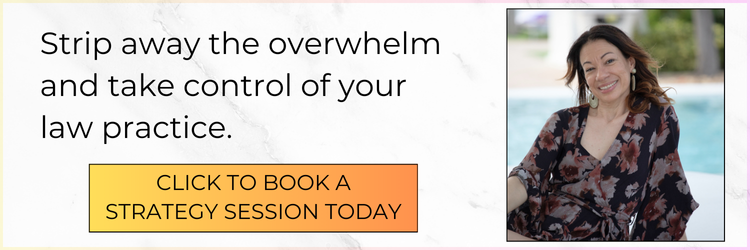If you’re working long hours, putting out fires, and not making the traction you want to see in your law practice, listen to today’s episode.
Here’s the truth: it’s not your fault.
Your brain is designed to keep you safe, not successful.
It’s a supercomputer, following the exact code it’s been given—often without your conscious awareness. Unless you examine that code, you may be running outdated programming leading to procrastination, overthinking, or making decisions blocking the growth you want in your law practice.
In this episode, you’ll learn:
- How your brain confuses fiction and reality
- Five thoughts (“programs”) you’ll want to eliminate
- You’ll also learn how to intentionally brainwash yourself to create the life and law practice you want
This episode isn’t about Pollyanna positivity or ignoring challenges.
It’s about taking back the steering wheel from the survival-focused part of your mind—and learning how to lead your practice with calm, clarity, and intention.
If you want different results, you must learn to think differently.
Listen in to learn how.
RESOURCES
Read this episode: Is Your Brain Holding You Back?
Your brain is a supercomputer.
Every thought you think has an impact on your life – big, small, true, or false. It doesn't matter. Our brains literally cannot tell the difference between truth and fiction.
Don't believe me? Try this quick experiment: Imagine a juicy lemon in front of you. You've just sliced through it with a knife, and you can see the juice oozing out. You can smell the citrus scent.
If you're imagining this vividly, you've probably noticed your mouth starting to water. That's because your brain doesn't distinguish between what's actually happening and what you're merely thinking about.
This is powerful information for lawyers who want to create a thriving practice without burning out. What you're telling yourself about your practice isn't just commentary – it's programming that directly shapes your results.
Why Your Brain Needs Reprogramming
If you're working long hours, constantly putting out fires, and still not seeing the progress you want in your practice, the problem isn't your work ethic. The problem is your brain's outdated programming.
Your brain is designed to keep you safe, not successful. It's following the exact code it's been given – often without your conscious awareness. Unless you examine that code, you may be running outdated programming that leads to procrastination, overthinking, or making decisions that block the growth you want.
When I work with lawyers, we identify the thoughts that are interfering with the life they want to create. These thoughts are blocking them from seeing possibilities and stretching into the version of themselves they want to become.
Every thought creates a feeling in your body. That stress, pressure, anxiety, or overwhelm you feel? It's caused by a “program” – a line of thought happening in your brain.
These feelings then drive your actions. You'll notice yourself:
- Procrastinating or taking action
- Doing busy work or focusing on priorities
- Putting off billing or immediately recording your time
All of this is caused by the “code” running in your brain – how you're thinking about your practice and yourself.
Five Thoughts to Eliminate From Your Practice
After working with countless lawyers, I've identified five common thought patterns that consistently sabotage success. Let's break them down:
1. “I have so much to do”
This thought creates overwhelming anxiety, pressure, and helplessness in your body. When you feel this way, you'll:
- Experience paralysis
- Tackle menial tasks before priorities
- Put off important projects until the last minute
- Fail to pause and review what actually needs to be done
I had a client who constantly told himself he had “so much to do.” When we broke down his actual tasks, he had six priority items for the week. His brain was creating overwhelm over what was actually a manageable workload once clearly defined.
The Upgrade: Replace this with “I have X specific things to prioritize this week” or “I can handle what's on my plate.”
How will you know if your new thought is working? You'll feel calm rather than anxious. The goal isn't to lie to yourself – it's to find a perspective that creates productive energy rather than paralysis.
2. “I can't do X because Y”
Examples:
- “I can't raise my rates because I'm afraid people will leave”
- “I can't leave the office at 4PM because of what people will think”
- “I can't hit my goals because I have maternity leave coming up”
This thought pattern defeats you before you even try. You'll know you're trapped in this thinking when you:
- Shut down new ideas without considering how they might work
- Feel resentful about being at the office when you're no longer productive
- Resent client work because you're not being paid what it's worth
- Make assumptions about what's possible without exploring options
The Upgrade: “I could do this if…” or “This is 100% possible for me if I…”
Then brainstorm how it could work. For example, with raising rates, ask yourself: When was the last time you raised them? Are you covering increasing expenses? Could you go back to your old rates if clients objected?
If you don't open your mind to possibility, you'll never discover what you're capable of.
3. “My assistant doesn't know what they're doing, so I can't rely on them”
This thought creates helplessness, frustration, and annoyance. You'll know it's operating when you:
- Don't delegate work
- Don't think about what training they might need
- Avoid conversations about performance
- Keep putting off meetings you know you need to have
The Upgrade: “I create good employees.”
This thought is empowering because it puts you in the driver's seat. If you create good employees, that means you're responsible for:
- Diagnosing problems
- Creating solutions
- Having curious conversations
- Providing necessary training
This perspective strengthens your problem-solving muscles and opens up new possibilities for developing your team.
4. “I don't have enough work”
This thought makes you feel powerless, helpless, and worried. You'll know it's operating when you:
- Don't want to work at all (it's demotivating)
- Buffer with numbing activities like extra coffee breaks or scrolling
- Focus on menial tasks instead of priorities
- Fail to appreciate or celebrate the work you do have
The Upgrade: “I create work.”
Ask yourself: How do I know this is true? You make phone calls, send emails, attend networking events, and complete the work you have (which often generates more work).
When you put yourself in the driver's seat of business development rather than waiting and hoping, your entire experience changes.
5. “I don't know”
“I don't know what to do next.” “I don't know where to start.” “I don't know what's causing the problem.”
This thought creates confusion, overwhelm, and sometimes dread. You'll know it's operating when you:
- Feel paralyzed at your desk
- Spend excessive time on busy work
- Rush to meet deadlines you knew about in advance
- Wait for the “right answer” instead of taking action
The Upgrade: “What if I did know? What would my best guess be?”
Every time I ask clients this question, they come up with an answer – and it's usually spot on. You know more than you think, but you need to ask yourself better questions.
How to Brainwash Yourself Effectively
Changing your thought patterns isn't as simple as deleting and replacing lines of code. It requires awareness and consistent practice. Here's how to do it effectively:
- Notice the thought patterns – Start by becoming aware of these five phrases in your daily thinking. You might be surprised how often they appear.
- Feel the impact – Notice how these thoughts make you feel physically and emotionally. This awareness helps create motivation for change.
- Test replacement thoughts – Try out new perspectives that feel believable to you. You'll know a thought works when it creates calm and certainty rather than anxiety or doubt.
- Practice consistently – Catch and redirect negative thoughts repeatedly. This is a skill that improves with practice.
- Get support – This process is challenging to do alone because your brain will fight to maintain its current programming.
The Power of Intentional Thinking
This isn't about Pollyanna positivity or ignoring legitimate challenges. It's about taking back the steering wheel from the survival-focused part of your mind and learning to lead your practice with calm, clarity, and intention.
Remember: Your brain doesn't know the difference between what's true and what you tell it is true. Use this to your advantage by programming thoughts that create the feelings and actions you want in your practice.
Every lawyer I've worked with who has mastered this skill has transformed not just their practice, but their entire life experience. They feel more peaceful, accomplish more, and enjoy their work again.
If you're ready to systematically rewrite the story of your practice so you can grow your business, have a life outside work, and rediscover the hobbies you used to love, I invite you to book a strategy session. We can talk about what it would look like to work together to create exactly what you want for your practice and your life.
The question isn't whether brainwashing works – it does. The real question is: who's doing the brainwashing? Will you let circumstance, outdated beliefs, and fear program your mind? Or will you take control and intentionally create the thoughts that lead to the life and practice you want?
The choice is yours.
💖
Dina




